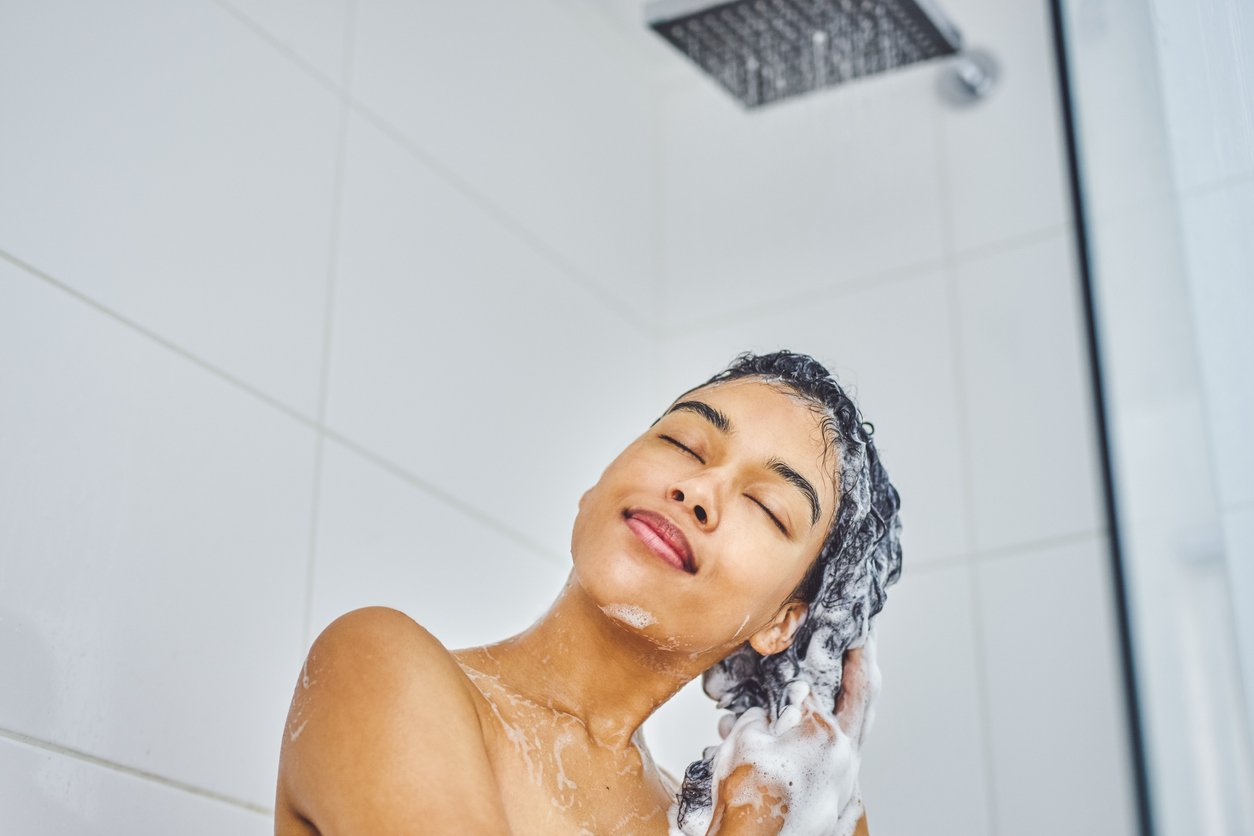Images sourced from Parade
By Kaitlin Vogel | Parade Magazine | March 24, 2021
Nothing is more frustrating than recurring headaches, especially if you’re unsure of what’s causing them. Sometimes it’s as simple as stress or a poor night’s sleep, but it can also be an indicator of an underlying health issue.
For example, if you’ve been experiencing intense pressure around your eyes, cheeks or forehead, your sinuses may be the culprit.
“Pressure that builds in your sinus cavities (located by your forehead, bridge of nose and cheeks) can typically cause the discomfort associated with a sinus headache,” says Dr. David Erstein, MD, a New York board-certified allergist and immunologist working with Advanced Dermatology PC.
What causes sinus headaches?
Having a cold or allergies is one of the most common causes of sinus headaches. “The inflammation and potential fluid buildup due to lack of drainage can be caused by infection and allergies,” Dr. Erstein explains. “Anatomical sinus issues may also cause fluid buildup due to issues like a deviated septum or nasal polyps.”
If your nose is feeling stuffy on a regular basis, that creates tension and inflammation around the sinuses. “Sinus pain occurs when the sinuses become swollen and/or the passageways narrow and become blocked,” says Dr. Omid Mehdizadeh, MD, otolaryngologist (ENT) and laryngologist at Providence Saint John’s Health Center in Santa Monica, CA.
Oftentimes, people mistake a migraine with nasal symptoms for a sinus headache. So, what’s the difference? A sinus headache is caused by a sinus infection, which has very specific symptoms.
Symptoms of a sinus headache
Symptoms include:
- Pain (deep, continuous & throbbing) located where your sinus cavities are (forehead above eyes, bridge of nose & cheeks). “Pain can shift with movement, and unfortunately, pain from sinus headaches can last for days,” Dr. Erstein says.
- Fever
- Ear fullness
- Stuffy or runny nose
- Thick and discolored mucous
Natural ways to get rid of a sinus headache
Here are the top doctor-approved ways to get rid of a sinus headache naturally
Apply a warm compress
Heat therapy is excellent for easing pain. Dr. Erstein suggests applying warm compresses to the areas that are causing you discomfort. Place it over the nose and forehead to open up your sinuses. Gently massage the sensitive spots to loosen up mucus.
Take a warm shower
 Showering can decrease congestion associated with sinus headaches, Dr. Bita Nasseri, MD, a Mayo Clinic-trained physician, explains. The steam helps open up your airways. Close the bathroom door and let the shower run for several minutes. The room will become steamy within minutes, and you can breathe in the steam.
Showering can decrease congestion associated with sinus headaches, Dr. Bita Nasseri, MD, a Mayo Clinic-trained physician, explains. The steam helps open up your airways. Close the bathroom door and let the shower run for several minutes. The room will become steamy within minutes, and you can breathe in the steam.
“For an added boost, use an aromatherapy shower bomb,” says Dr. Nasseri. “I love Euka’s Wellness Shower Bombs with a detox blend including peppermint to clear the respiratory tract and stimulate circulation, and a calm blend with lavender and eucalyptus to relieve respiratory conditions.
Inhale water vapor
Just as warm water from a shower can help you breathe better, inhaling water vapor through your nasal passages can help with congestion relief. Dr. Mehdizadeh recommends inhaling vapors with eucalyptus or menthol.
According to research, peppermint oil helps fight bacteria, which is a cause of sinus congestion. And since it contains menthol, it also acts as a powerful decongestant.
Get a good night’s sleep
Sleep has been proven to bolster the T cells in your body that fight off infection, says Dr. Nasseri. Bonus tip: To minimize congestion, adjust your sleep position. Use an extra pillow to prop up your head. Keeping your head elevated while you sleep can help drain mucus and relieve some of the pressure.
Hydrate
 Staying hydrated is a crucial part of the healing process. Thick mucus makes congestion worse, and drinking water helps thin nasal secretions and drains your sinuses.
Staying hydrated is a crucial part of the healing process. Thick mucus makes congestion worse, and drinking water helps thin nasal secretions and drains your sinuses.
“Sick patients lose metabolites and fluids quickly, ” says Dr. David R. Edelstein, MD, otolaryngologist, and head and neck surgeon. “Patients with sinusitis need to drink lots of fluids and juice since the nose runs a lot and this is another source of fluid loss. Fever also increases the fluid needs.”
Keep a water bottle nearby throughout the day to make sure you’re getting enough fluids.
Try aromatherapy
Known for their infection-fighting properties, essential oils can help treat different types of headaches. Most commonly used are peppermint, rosemary, lavender, chamomile and eucalyptus.
Dr. Nasseri recommends using aromatherapy on pressure points with oil carriers for topical absorption. “It must be very diluted as higher concentrations of essential oils are not side effect-free,” Dr. Nasseri explains. “They work by their anti-inflammatory and muscle relaxing properties and desired changes with blood flow to the brain.”
Drink caffeine
 Pure espresso is better for a headache.
Pure espresso is better for a headache.
“Tea has other byproducts that in some people worsen headaches,” Dr. Nasseri explains. “Caffeine narrows blood vessels in the brain and slows the rush and pressure of blood flow to the brain, hence improving your headaches.”
Use a neti pot
A neti pot is a great tool for relieving a sinus headache, says Dr. Stacie Stephenson, Certified Nutrition Specialist, CEO of VibrantDoc and author of Vibrant: A Groundbreaking Program to Get Energized, Own Your Health, and Glow.
She recommends adding ½ teaspoon natural sea salt to 1 cup distilled water (or boiled and cooled tap water), then flush your sinuses with this saline mixture.
How to Prevent a Sinus Headache
Once you learn what’s causing your headache, you can take the steps to prevent them in the future. “If the inflammation comes because you have allergies, then identifying what you are allergic to and implementing reduction strategies can be helpful,” Dr. Epstein states.
First, avoid environmental triggers. Since seasonal allergies are a common cause of sinus headaches, it’s wise to limit your time outdoors—at least until your symptoms start improving.
“Avoid irritants such as strong perfumes/colognes and smoke that trigger inflammation of nasal mucosa and secretion of mucus,” says Dr. Nicole Aaronson, MD, pediatric otolaryngologist. “Keep the nasal passages moist with nasal saline spray and/or a humidifier. If there are underlying allergies, treat the allergies or avoid allergens when possible. Maintain good hydration to prevent nasal congestion.”
To minimize the chances of getting a headache in the midst of allergy or cold season, Dr. Stephenson recommends avoiding the following:
- Vacuuming daily during allergy season to minimize indoor allergens.
- Change bed sheets every few days, to minimize allergens.
- Use an indoor air purifier and clean the filter regularly.
- Stay hydrated.
- Avoid alcohol when congested, which can trigger more pressure.
- Avoid flying, as that can also increase sinus pressure and trigger a headache.
- Use a humidifier at night, but keep it squeaky-clean, to avoid mold.
- When you have a cold, use a neti pot daily.
As a general guideline, it’s important to stay hydrated, eat healthy, exercise, and get enough sleep to keep your immune system functioning at its best and maintain optimal health.
However, if all else fails, you may need to consult your primary healthcare doctor for medication.
“If reduction strategies are not enough, you may want to consider daily antihistamines, intranasal steroids, decongestants or even allergy immunotherapy if suggested by your doctor,” Dr. Epstein adds.
What to do about recurring sinus headaches
If your headache is due to allergies, then deal with your allergies as aforementioned. If there is an anatomical issue, you may benefit from medical (and in severe cases surgical) intervention.
It is important to note that there’s a lot of overlap between sinus headaches and migraines and thus a lot of misdiagnosed sinus headaches may actually be migraines, Dr. Epstein states. It’s best to speak to your doctor if symptoms are recurring, for clarification of diagnosis and proper management.
